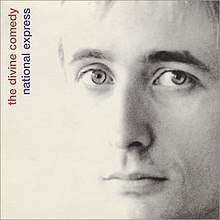National Express (song)
"National Express" is a song by the Divine Comedy. It was released as the third single from the album Fin de Siècle and reached number eight on the UK Singles Chart and number 18 in Ireland. The song is based on Neil Hannon's observations of life from the window of a National Express coach.
| "National Express" | ||||
|---|---|---|---|---|
 | ||||
| Single by The Divine Comedy | ||||
| from the album Fin de Siècle | ||||
| B-side | "Going Downhill Fast", "Radioactivity", "Famous", "Overstrand" | |||
| Released | 25 January 1999 | |||
| Genre | Post-Britpop | |||
| Length | 5:05 | |||
| Label | Setanta | |||
| Songwriter(s) | Neil Hannon | |||
| Producer(s) | Jon Jacobs | |||
| The Divine Comedy singles chronology | ||||
| ||||
Music Video
The official video for the song, directed by Matthew Kirkby, examines with some irony the UK National Health Service from the viewpoint of a mental health patient (portrayed by Hannon) in a psychiatric hospital filmed at the now demolished Joyce Green Hospital in Dartford, Kent. The video begins with a doctor and a woman (the patient’s wife), with faces hidden and only their hands shown, talking about the patient’s problems. As the music starts, it then cuts to Hannon as the patient, being pushed in a wheelchair by a porter to the wards and then taking his medication, The patient gets out of his hospital bed and starts dancing around.
The porter returns the patient back to the wheelchair and takes him for electroconvulsive therapy. On the way the patient starts to behave erratically and the porter tries to control him. The video ends with the patient shown being unconscious from his treatment and the porter pushing him back to the ward in the wheelchair. The patient eventually starts to wake up, with two shots of his feet dancing, before the final shot of the patient smiling fades to a long stretch of road.
Reception
The music press took aim at Hannon for "sneering" at the working classes on the track.[1] Steven Wells of NME wrote: "What a filthy, disgusting, revolting, nauseating little record this is! Summed up in one utterly crass but nonetheless deeply psychologically revealing lyric, we find all the reasons we'll ever need to hate The Divine Comedy... This is mock-pop. This is the work of an 'artist' who thinks himself superior to his art form and despises his audience."[2]
Hannon commented: "'National Express', even though it was a bit of a silly song, is pure observation, nothing made up – I'm on this bus, this is what I see. 'The family man/manhandling the pram/with paternal pride' is me having a dig at my brother for having a kid and being Nineties Man, you know, and he's not exactly working class."[1]
Track listing
All tracks written by Neil Hannon; except where indicated.
- CD1 (SETCDA069)
- "National Express (Radio Edit)"
- "Going Downhill Fast"
- "Radioactivity" (Ralf Hütter, Florian Schneider, Emil Schult) (Kraftwerk cover version)
- CD2 (SETCDB069)
- "National Express (Full Album Version)"
- "Famous" (Stephen Merritt) (The Magnetic Fields cover version)
- "Overstrand"
- Cassette (SETMC069)
- "National Express (Full Album Version)"
- "The Heart of Rock and Roll"
Charts
| Chart (1999) | Peak position |
|---|---|
| Ireland (IRMA)[3] | 18 |
| Scotland (Official Charts Company)[4] | 7 |
| UK Singles (Official Charts Company)[5] | 8 |
| UK Indie (Official Charts Company)[6] | 2 |
References
- musicOMH.com - Music - Interviews - The Divine Comedy - Neil Hannon (1999)
- Wells, Steven (23 January 1999). "This week's singles". NME. Retrieved 2 December 2018.
- "The Irish Charts – Search Results – National Express". Irish Singles Chart. Retrieved 8 November 2018.
- "Official Scottish Singles Sales Chart Top 100". Official Charts Company. Retrieved 8 November 2018.
- "Official Singles Chart Top 100". Official Charts Company. Retrieved 8 November 2018.
- "Official Independent Singles Chart Top 50". Official Charts Company. Retrieved 8 November 2018.
External links
- Divine Comedy - National Express - official video clip on YouTube
- Lyrics of this song at MetroLyrics
- Take the National Express - article about the song's importance to National Express Coach's brand recognition
- The Divine Comedy - National Express (Later Archive 1998) on YouTube